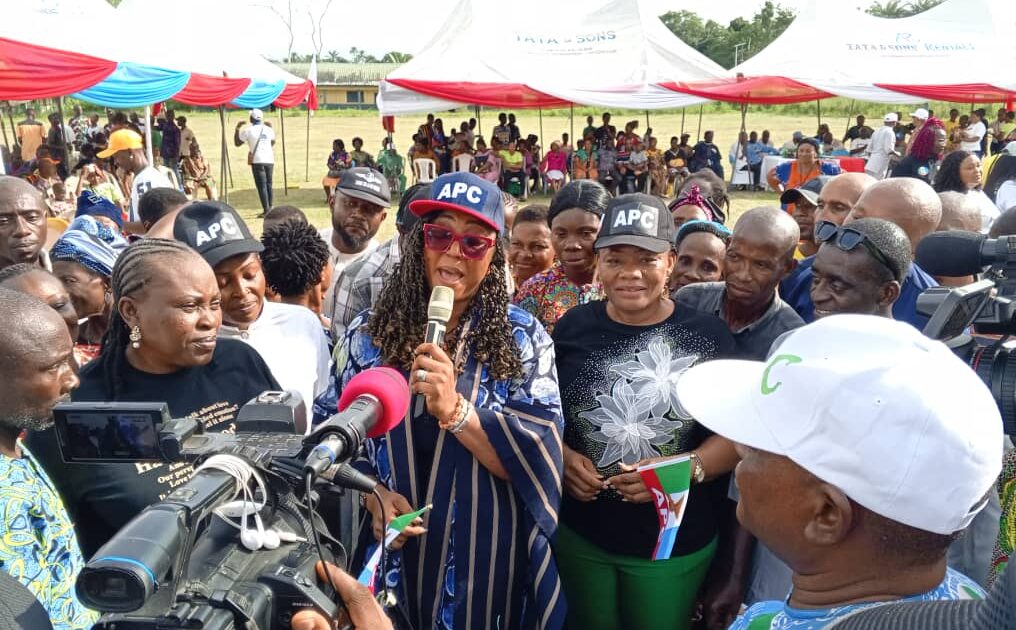The political landscape of Cross River State experienced a significant shift with the defection of Dr. Emana Ambrose-Amawhe, the Peoples Democratic Party (PDP) deputy governorship candidate in the 2023 elections, to the ruling All Progressives Congress (APC). This move, accompanied by a wave of her supporters, underscores a growing momentum towards the APC in the state and signals potentially significant implications for the future political balance of power. Ambrose-Amawhe’s defection ceremony, held at her ward in Akpabuyo Local Government Area, served as a platform for her to articulate the reasons behind her decision, emphasizing the developmental strides of the APC at both the state and national levels.
Central to Ambrose-Amawhe’s rationale was her admiration for the performance of Governor Bassey Otu, highlighting his tangible achievements and her desire to contribute to the ongoing progress. This praise for the governor’s work positions her defection as a vote of confidence in the APC’s leadership and its capacity to deliver on its promises. Furthermore, she extended her positive assessment to the national level, acknowledging President Bola Tinubu’s efforts to address economic challenges, expressing confidence in his long-term vision for the country’s economic recovery. Her endorsement of both state and national leadership reinforces the perception of a unified and effective APC.
Dismissing any speculation about ulterior motives, Ambrose-Amawhe insisted that her decision was not driven by personal gain or the pursuit of political appointments. Instead, she framed her move as a commitment to collaborative governance, emphasizing her desire to work alongside those in power to bring tangible benefits to the grassroots level. This focus on community development resonates with a broader call for unity and participation in the political process. Her appeal to those remaining in the opposition to join forces with the APC further underscores this message of collaboration, urging them to move beyond criticism and contribute actively to the state’s progress.
Ambrose-Amawhe’s decision to join the APC was presented not only as a personal choice but also as a pragmatic one. She characterized herself as a “business-minded” individual drawn to an environment where concrete action is taken. This portrayal contrasts with her perception of the opposition parties, which she described as fragmented and lacking the cohesion necessary for effective governance. By joining the APC, she positioned herself within a party she views as proactive and capable of achieving its objectives, aligning with her own pragmatic approach to political engagement.
Welcoming Ambrose-Amawhe and her supporters into the APC fold, the party’s state secretary, Patrick Asikpo, extended assurances of equal treatment and full integration. He stressed the importance of unity and discouraged any internal strife, emphasizing the collective strength of the party. Asikpo’s message of inclusivity aimed to solidify the new alliance and ensure a smooth transition for the incoming members. This welcoming stance reinforces the image of the APC as a growing force, attracting individuals from across the political spectrum.
The significance of Ambrose-Amawhe’s defection was further amplified by the presence of prominent APC figures, including former Minister of Tourism, High Chief Edem Duke, who serves as the ward leader. Duke expressed optimism about the APC’s prospects in the 2027 elections, viewing Ambrose-Amawhe’s move as a sign of shifting political tides. His interpretation of this event as a significant boost to the APC’s standing further underscores the potential ramifications of this defection for the political landscape of Cross River State, suggesting a growing wave of support for the ruling party. The defection of such a high-profile figure from the opposition adds weight to the perception of the APC as the dominant political force in the state and raises questions about the future viability of the opposition.


